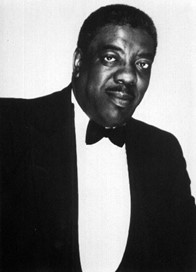
James Cleveland
James Cleveland was a pioneer of contemporary gospel. His novel approach combines early, traditional, and golden age gospel with the secular styles of the day (soulA style of composition developed in America in the 1960's conveying strong emotion. This style of music is characterized by dramatic delivery of the vocal line, commonly including wails, sighs, cries, falsetto, whispers, etc. and funkA genre of popular music in America from the last half of the 20th century that combines elements of jazz, blues, rock, and soul. Attributes of this music include syncopated rhythms, a heavy, repetitive bass line, simple chord progressions, and simple musical form. ), which marks his relationship with the aforementioned music features of " Oh Happy Day" His work draws from his career as a composer, arranger, pianist, and occasional singer/narrator for his childhood friend, Albertina Walker, popularly referred to as the "Queen of Gospel," "Starmaker," and founder of The Caravans. It's worth noting that The Caravans became the launching pad for some of today's gospel legends. Other distinguished members of the group include:
- Shirley Caesar, known as the First Lady of Gospel.
- Cassette George, who co-wrote some of the group's best hits.
- Delores Washington, who joined the group in 1958, and "looked up to Albertina Walker, a fellow Caravan who was considered one of the queens of gospel. She said 'Tina' was like a big sister, guiding her in the music business and teaching her about life on the road, including how to navigate Whites-only hotels and restaurants in the Jim Crow-era South."
- Josephine Howard, mother to R & B artist Miki Howard.
- Inez Andrews, whose song "
Mary, Don't You Weep" became a staple in the industry - The Reverend James Herndon, pianist, writer, singer, and member of the Caravans from 1959 to 1967). Following their respective tenures with the Caravans, Rev. Herndon became the accompanist for Inez Andrews. He also formed the James Herndon Singers and recorded many albums.
- Dorothy Norwood, known as Gospel's Greatest Storyteller.
- Loleatta Holloway, who became a legendary dance recording artist in the late 1970s.
Among his many achievements and the inspiration he provided for others, Cleveland's pioneering efforts are also seen in the song " I Want to Thank You, Master," from the 1972 gospel album Amazing Grace. In this case, it is rhythmically similar to Sly & The Family Stone's funk song "Thank You (Falettinme Be Mice Elf Agin) " from their 1970 Greatest Hits album. For example, listen to Cleveland's opening statement at 00:09-00:15, "I want to thank you, Master, for makin' a way for me," which is melodically and rhythmically similar to the chorus in Sly's song when the group sings at 00:55-01:00, "Thank you falettinme be mice elf again" in unison. Also, the wah-wah guitar effect is present in both pieces (first song it starts at 00:00, and at 00:10 in the second song).






